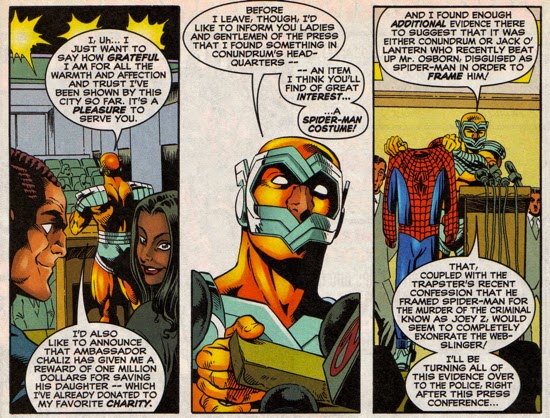Man of the People
Credits: Glenn Greenberg (writer), Luke Ross (penciler), Al Milgrom (inks), John Kalisz (colors), Comicraft’s Kiff Scholl (letters)
The Plot: Prodigy uses his spider-sense to see through Mad Jack and Conundrum’s illusions. After Mad Jack escapes, Prodigy discovers that Conundrum only wanted the Hand of Mumthazi and has no interest in Tabriaz. Prodigy intimidates Conundrum into revealing Tabriaz’s location. While there, he’s attacked by Mad Jack. Norman Osborn arrives with his armed guards. One of them, Kenneth, shoots and apparently kills Mad Jack. With the Hand of Mumthazi recovered, Tabriaz rescued, Conundrum in custody, and Mad Jack dead, Osborn is pleased. His mood is disrupted, however, when Prodigy announces at a news conference that he’s found a Spider-Man suit at Conundrum’s hideout, implicating him as the impostor Spider-Man that beat Norman Osborn. Later, the Daily Bugle clears Spider-Man. Peter returns to his original alter ego, while Norman Osborn has a secret meeting with Mad Jack.
The Subplots: None.
Web of Continuity:
- This story has to be set “in-between the pages” of Peter Parker, Spider-Man #92 and Amazing Spider-Man #435-436, since the Trapster has already confessed to Joey Z’s murder by the time Prodigy has his press conference.
- Mad Jack was in on Norman Osborn’s scheme from the beginning. He accepts Osborn’s payment (previously, he burned the money) and explains that faking his death will help him move in the shadows. Osborn claims that the recent events will make him more of a public hero and will place Ambassador Chaliz in his debt.
- According to Norman Osborn, Ambassador Chaliz is an old friend, and his family was among the few who knew he was still alive while hiding out in Europe.
- This issue makes it clear that Conundrum’s ransom note to Ambassador Chaliz demanded they meet at Maquire’s bar, which is how Prodigy knew where to find him last issue. Why both Conundrum and Mad Jack have a connection to the bar isn’t revealed.
Forever Young: Peter’s response to meeting the beautiful Tabriaz would seem to be an attempt to reinsert a bit of “girl trouble” in the title (although he does at least feel guilty for noticing how pretty she is.)
Review: Glenn Greenberg is credited as the “incoming writer,” although I think it was already known within Marvel that Spectacular would be cancelled soon. Greenberg’s previous work in Unlimited and his prose stories lead me to believe that he’s a respectable choice to be taking over this title, even if it is only for a few issues. Debuting as the guy playing clean-up on a two-parter taking place within a larger event, however, isn’t going to be the best showcase of anyone’s talents.
Both Greenberg and Ross do a competent job closing the story out, but it’s hard to say that there’s anything particularly exciting going on. The villains are defeated, the girl is rescued, Spider-Man’s name is cleared, Norman Osborn maintains his public image, and not a single mystery involving Mad Jack and Conundrum is resolved. (Even with Mad Jack “dead,” there’s no effort to take his mask off and discover his true identity. Spider-Man doesn’t seem curious about his body at all, actually.) The status quo simply reverts back to normal, with only a small amount of hand-wringing on Spider-Man’s part for planting evidence at Conundrum’s hideout. Initially, this seemed like too much of a copout ending, although now that I think about it, I can understand why the creators wanted to end the bounty storyline cleanly. Spider-Man is guilty of beating Osborn, but it’s inconvenient story-wise for the Daily Bugle to have a bounty on him forever, so there has to be some kind of closure. So, I accept that Spider-Man has to be cleared in some way for the beating, but I question the execution. As I mentioned, Spider-Man feels a bit guilty about implicating Conundrum in the attack, but he’s over it by the final page. Ultimately, that small amount of guilt is the only price he pays for losing his temper and attacking Osborn, which is letting Spidey off too easily. I also question his willingness to plant evidence implicating anyone, even a villain, for a crime he didn’t commit. If Spider-Man were to make a dubious moral choice like that, it seems like something he would angst over for at least a few issues.


No comments:
Post a Comment